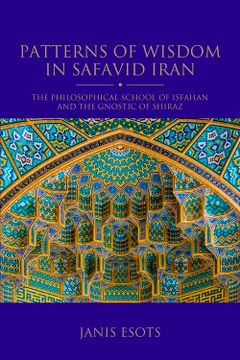Compartir
Patterns of Wisdom in Safavid Iran: The Philosophical School of Isfahan and the Gnostic of Shiraz (Shi'i Heritage Series) (en Inglés)
Janis Esots (Autor)
·
I.B. Tauris
· Tapa Blanda
Patterns of Wisdom in Safavid Iran: The Philosophical School of Isfahan and the Gnostic of Shiraz (Shi'i Heritage Series) (en Inglés) - Janis Esots
37,77 €
39,76 €
Ahorras: 1,99 €
Elige la lista en la que quieres agregar tu producto o crea una nueva lista
✓ Producto agregado correctamente a la lista de deseos.
Ir a Mis Listas
Origen: Reino Unido
(Costos de importación incluídos en el precio)
Se enviará desde nuestra bodega entre el
Jueves 13 de Junio y el
Lunes 24 de Junio.
Lo recibirás en cualquier lugar de España entre 1 y 5 días hábiles luego del envío.
Reseña del libro "Patterns of Wisdom in Safavid Iran: The Philosophical School of Isfahan and the Gnostic of Shiraz (Shi'i Heritage Series) (en Inglés)"
The exceptional intellectual richness of seventeenth-century Safavid Iran is epitomised by the philosophical school of Isfahan, and in particular by its ostensible founder, Mir Damad (d. 1631), and his great student Mulla Sadra (aka Sadr al-Din Shirazi, d. 1636). Equally important to the school is the apophatic wisdom of Rajab 'Ali Tabrizi that followed later (d. 1669/70). However, despite these philosophers' renown, the identification of the 'philosophical school of Isfahan' was only proposed in 1956, by the celebrated French Iranologist Henry Corbin, who noted the unifying Islamic Neoplatonist character of some 20 thinkers and spiritual figures; this grouping has subsequently remained unchallenged for some fifty years. In this highly original work, Janis Esots investigates the legitimacy of the term 'school', delving into the complex philosophies of these three major Shi'i figures and drawing comparisons between them. The author makes the case that Mulla Sadra's thought is independent and actually incompatible with the thoughts of Mir Damad and Rajab Ali Tabrizi. This not only presents a new way of thinking about how we understand the 'school of Isfahan', it also identifies Mir Damad and Rajab Ali Tabrizi as pioneers in their own right.
- 0% (0)
- 0% (0)
- 0% (0)
- 0% (0)
- 0% (0)
Todos los libros de nuestro catálogo son Originales.
El libro está escrito en Inglés.
La encuadernación de esta edición es Tapa Blanda.
✓ Producto agregado correctamente al carro, Ir a Pagar.

